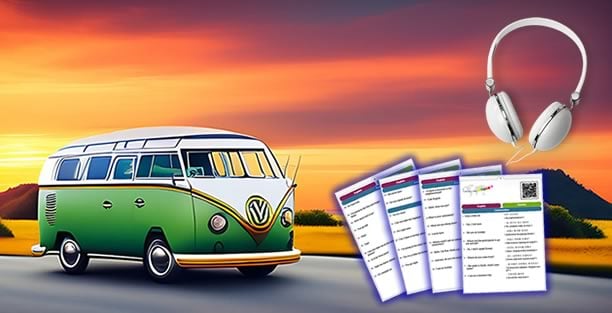Learn Italian
| English | Italian | |||
|---|---|---|---|---|
| Hello | Buongiorno | |||
| Hi! | Ciao! | |||
| Good evening | Buonasera | |||
| Goodbye | Arrivederci | |||
| See you later | A dopo | |||
| Yes | Sì | |||
| No | No | |||
| Please! | Per favore! | |||
| Thanks | Grazie | |||
| Thanks a lot | Grazie mille | |||
| Thank you for your help | Grazie per il suo aiuto | |||
| Don't mention it | Prego | |||
| Ok | Va bene | |||
| How much is it? | Quanto costa, per favore? | |||
| Sorry! | Mi scusi ! | |||
| I don't understand | Non ho capito | |||
| I get it | Ho capito | |||
| I don't know | Non so | |||
| Forbidden | Vietato | |||
| Excuse me, where are the toilets? | Dov'è il bagno per favore ? | |||
| Happy New Year! | Buon anno! | |||
| Happy birthday! | Buon compleanno! | |||
| Happy holiday! | Buone feste! | |||
| Congratulations! | Congratulazioni! |
How to learn Italian on your own? Start with an easy and free online course!
We have taken a practical approach to help you quickly grasp the basics of a language. We suggest starting by memorizing useful words and expressions that you can use daily at home and that will also be helpful when you travel. Practicing pronunciation out loud—numbers, for example—is an excellent exercise that can be done anytime throughout the day.
This will get you used to the sounds of the language and make listening more familiar. Once you arrive in Rome or Venice for your vacation, you’ll be surprised at how familiar and easy to understand the language already feels.
Moreover, having a pocket dictionary with you will always be useful when traveling, allowing you to look up unknown words and expand your vocabulary on a regular basis.
Why speak Italian when traveling?
Culture, fashion, soccer, cuisine, and economy
A single title isn’t enough to list all the good reasons to learn Italian, a language as vibrant and cheerful as its people. Whether it’s to better understand the literary masters of yesterday and today (like Dante, Pirandello, or Umberto Eco) or to discover every ingredient in your favorite dishes, Italian is the language you need to broaden your skills and boost your career!
Rich in history and culture, the territory of modern-day Italy was once home to the Etruscan, Greek, and Roman civilizations, which explains the impressive number of classical antiquity archaeological sites throughout the country.
Millions of tourists who flock to Italy year-round are also dazzled by the works of masters such as Da Vinci, Michelangelo, and Botticelli, as well as by the architecture that turns cities like Florence and Ferrara into open-air museums.
Fashion is another iconic draw for the country, one of the world’s leading exporters of luxury products like Ferrari, Maserati, Prada, Gucci, Dolce & Gabbana, Armani, Azimut, Riva, and more. Elegance and design are likewise promoted through events like Milan Fashion Week.
Italian cuisine is indispensable to the country’s appeal. It’s Europe’s favorite cuisine and one of the most popular worldwide, fueling a growing trend in Italy’s wine and gastronomic tourism. The allure of fresh, well-seasoned ingredients is so strong that the Mediterranean diet was declared an intangible cultural heritage by UNESCO in 2010.
History and food enthusiasts have many reasons to rejoice during a stay in Italy: in addition to traditional pasta, cheese, and charcuterie, the country is responsible for two major inventions of modern cuisine—the ice cream cone and espresso coffee.
A language for business
Ranked as the 8th largest economy in the world and the 4th largest in Europe, Italy is home to major corporations like Fiat, Benetton, and Luxottica, which operate worldwide.
This alone underscores the advantage of speaking Italian, one of the official languages of the European Union and seven other countries, with more than 61 million speakers.
The language of Dante is also spoken in several Italian-speaking communities around the world, such as in Brazil and the United States. So, what are you waiting for to dive in?
A complete guide to learning Italian effectively
Below is a detailed, comprehensive guide with concrete tips and useful tricks to help you get started and make quick progress in learning Italian:
1. Immerse yourself in the language every day
Immersion is essential for rapid progress in Italian. Here’s how you can immerse yourself daily:
- Podcasts: Listen regularly to Italian podcasts such as Coffee Break Italian, News in Slow Italian, or Italiano Automatico. Start with just 10 minutes a day and gradually increase.
- TV series and films: Watch popular Italian series on Netflix with Italian subtitles.
- Social media: Follow Italian Instagram accounts and comment in Italian.
- Radio: Listen to Radio Italia or Rai Radio 2 during your commute or while doing chores.
- Newspapers: Read news articles on websites like Il Post or ANSA.
2. Learn through active practice
Regular practice is crucial for making progress. Here’s how to practice actively:
- Loecsen.com: Use the interactive method to learn thematic vocabulary in context.
- Browse illustrated vocabulary lists and listen to how common phrases are pronounced.
- Practice reading and repeating each phrase using our unique Read Aloud tool.
- Evaluate yourself by recording your voice and comparing it to the native speaker audio.
- Conversation groups: Join Meetup groups or participate in online language exchanges.
- Language exchange: Find a partner on Tandem or HelloTalk and schedule regular sessions.
- Online lessons: Take classes with native speakers on italki or Preply.
3. Focus on useful vocabulary
A solid vocabulary is key to communicating effectively. Here’s how to expand it:
- Use Loecsen to learn the essential basics:
- Work on crucial themes (greetings, restaurants, travel, emergencies, etc.).
- Review and test your knowledge with interactive exercises.
- Use dedicated tools:
- Read Aloud on Loecsen to improve your fluency by repeating key sentences.
- Idiomatic expressions: Learn common idioms and include them in your daily life.
4. Work on your pronunciation
Good pronunciation is essential for being understood. Here’s how to refine it:
- Use Loecsen’s “Read Aloud” page:
- Select a sentence, listen to the native pronunciation, and repeat it out loud.
- Record yourself and compare your pronunciation to the original.
- Repeat multiple times until your pronunciation is smooth.
- Other exercises:
- Practice challenging sounds (the rolled r, double consonants, stress accents, etc.).
- Use Forvo to hear different regional accents.
5. Immerse yourself in Italian culture
Understanding Italian culture will help you grasp the language more easily. Here’s how to immerse yourself:
- Literature: Read simple short stories and progress to short novels.
- Music: Examine the lyrics of Italian songs.
- Cooking: Follow recipes in Italian while you cook.
- History and art: Enroll in free online courses or take virtual museum tours.
6. Structure your learning
A structured approach helps you make steady progress:
- Goals: Set SMART goals (e.g., “Reach B1 level in 6 months”).
- Planning: Incorporate Loecsen into your daily routine:
- Monday: 15 minutes of Loecsen vocabulary + 10 minutes of reading aloud.
- Tuesday: 20 minutes of conversation on Tandem.
- Wednesday: 10 minutes of active listening + 20 minutes of Loecsen exercises.
- Thursday: 15 minutes of grammar + 10 minutes of speaking practice.
- Friday: 30 minutes of watching a video in Italian.
- Weekend: Review and free practice.
- Monitoring: Track your progress in a journal and adjust your methods if necessary.
7. Additional resources
- Loecsen.com: One of the best platforms for contextual vocabulary learning.
- Dictionary:WordReference for accurate translations.
- YouTube channels:Learn Italian with Lucrezia, Italy Made Easy, etc.
- Apps:Reverso Context for viewing words in context.
By following this guide and making the most of Loecsen.com, you’ll make significant progress in Italian. Don’t forget to include reading aloud in your daily learning to improve your pronunciation and fluency.
Buona fortuna!





